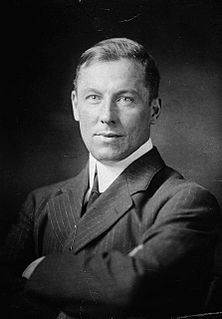A Quote by William Cowper
I was a poet too; but modern taste
Is so refined and delicate and chaste,
That verse, whatever fire the fancy warms,
Without a creamy smoothness has no charms.
Thus, all success depending on an ear,
And thinking I might purchase it too dear,
If sentiment were sacrific'd to sound,
And truth cut short to make a period round,
I judg'd a man of sense could scarce do worse
Than caper in the morris-dance of verse.
Related Quotes
You relax within the verse. You realize the structure of the verse and relax into it. It's like swimming. Or riding a bike. You can't make it sound real if you are thinking it through as you go. You can't think through Shakespeare, you have to speak it. And listen to the rhythm of it and then it takes you over. And to make it sound real you speak as if you believe it. Don't act it. Just be it.
Whatever you think The Uni-verse is withholding from you, YOU are withholding from The Uni-verse. If you think that The Uni-verse isn't answering your prayers, chances are you aren't listening to your intuition and following it. You are so scared that you ask for new intuition, but that's not how life works. The Uni-verse is constantly whispering to you, nudging you to trust It and take a leap. But if you don't take the leap of faith, then The Uni-verse can't open any more doors for you.
The first thing that strikes you about Timothy Murphys verse is the palpable texture of his line - that sound of sense practised by that other American poet-farmer, Robert Frost. And just as Murphys ear is trained on the rhythms of local speech and classical epigram, his eye holds fast on the image. This is an undeluded vision, sometimes bleak, often funny, and never less than painstakingly crafted.
Imagination in a poet is a faculty so wild and lawless that, like a high ranging spaniel, it must have clogs tied to it, lest it outrun the judgment. The great easiness of blank verse renders the poet too luxuriant. He is tempted to say many things which might better be omitted, or, at least shut up in fewer words.
The immediate success of the war poem anthologies ... proved that the war had aroused in a new public an ear for contemporary verse ... There has never before, in the world's history, been an epoch which has tolerated and even welcomed such a flood of verse as has been poured forth over Great Britain during the last three years.
Truth is disputable; not taste: what exists in the nature of things is the standard of our judgement; what each man feels within himself is the standard of sentiment. Propositions in geometry may be proved, systems in physics may be controverted; but the harmony of verse, the tenderness of passion, the brilliancy of wit, must give immediate pleasure. No man reasons concerning another's beauty; but frequently concerning the justice or injustice of his actions.
Nietzsche is absolutely correct, even more correct today than when he wrote it in Thus Spake Zarathustra: I looked all about me for human beings but all I saw were fragments, deformed creatures with too much eye or too much ear. This is what the modern culture of specialized intellect-the kind of one-sidedness that banausic utilitarianism alone can value-works so hard to produce.
Our senses perceive no extreme. Too much sound deafens us; too much light dazzles us; too great distance or proximity hinders ourview. Too great length and too great brevity of discourse tends to obscurity; too much truth is paralyzing.... In short, extremes are for us as though they were not, and we are not within their notice. They escape us, or we them.
I wanted to understand things and then be free of them. I needed to learn how to telescope things, ideas. Things were too big to see all at once, like all the books in the library-everything laying around on all the tables. You might be able to put it all into one paragraph or into one verse of a song if you could get it right.






































